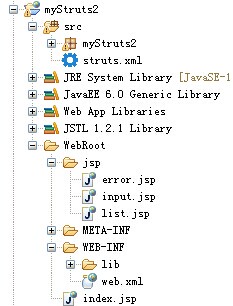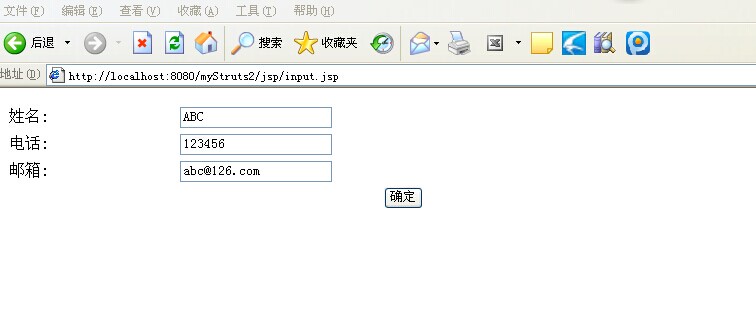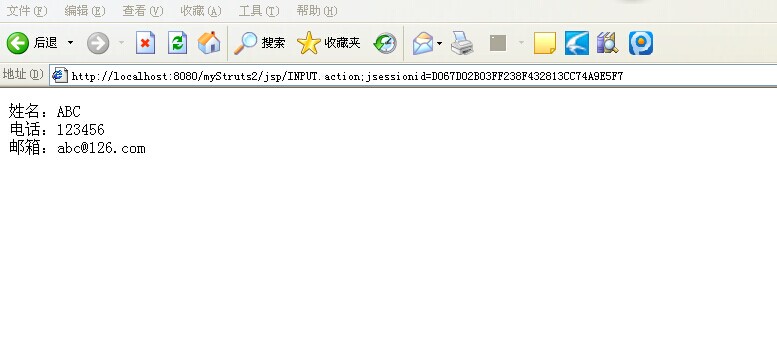Struts2例子
(1)用MyEclipse建立一个Web Project,项目名称为myStruts2,结构如下图:

(2)导入struts2需要的包,我是把解压后的struts-2.3.16.3\apps\struts2-blank\WEB-INF\lib\下面所有的包都导入;
(3)修改web.xml,设置filter和filter-mapping:
<?xml version="1.0" encoding="GB2312"?> <web-app xmlns="http://java.sun.com/xml/ns/j2ee" xmlns:xsi="http://www.w3.org/2001/XMLSchema-instance" version="2.4" xsi:schemaLocation="http://java.sun.com/xml/ns/j2ee http://java.sun.com/xml/ns/j2ee/web-app_2_4.xsd"> <filter> <filter-name>struts2</filter-name> <filter-class>org.apache.struts2.dispatcher.FilterDispatcher</filter-class> </filter> <filter-mapping> <filter-name>struts2</filter-name> <url-pattern>/*</url-pattern> </filter-mapping> <welcome-file-list> <welcome-file>index.jsp</welcome-file> </welcome-file-list> </web-app>
(4)在WebRoot\jsp\下面新建三个jsp文件:
input.jsp,用于输入信息
<%@ page language="java" pageEncoding="gb2312"%> <!DOCTYPE HTML PUBLIC "-//W3C//DTD HTML 4.01 Transitional//EN"> <!-- struts2标签库调用声明 --> <%@taglib prefix="s" uri="/struts-tags"%> <html> <head> <title>输入页面</title> </head> <body> <!-- form标签库定义,以及调用哪个Action声明 --> <s:form action="INPUT"> <table width="60%" height="76" border="0"> <!-- 各标签定义 --> <s:textfield name="name" label="姓名"/> <s:textfield name="phone" label="电话"/> <s:textfield name="mail" label="邮箱"/> <s:submit value="确定" align="center"/> </table> </s:form> </body> </html>
list.jsp,用于列出输入的信息
<%@ page language="java" contentType="text/html; charset=GB2312"%> <!DOCTYPE HTML PUBLIC "-//W3C//DTD HTML 4.01 Transitional//EN"> <html> <head> <title>输入成功</title> </head> <body> <!-- 取得session中用户名值 --> 姓名:${sessionScope.name}<br> 电话:${sessionScope.phone}<br> 邮箱:${sessionScope.mail} </body> </html>
error.jsp,用于出错提示:
<%@ page language="java" contentType="text/html; charset=GB2312"%> <!DOCTYPE HTML PUBLIC "-//W3C//DTD HTML 4.01 Transitional//EN"> <html> <head> <title>输入失败</title> </head> <body> 失败,请重新输入! </body> </html>
(5)创建struts.xml文件,设置package和Action:
<?xml version="1.0" encoding="gb2312"?> <!DOCTYPE struts PUBLIC "-//Apache Software Foundation//DTD Struts Configuration 2.0//EN" "http://struts.apache.org/dtds/struts-2.0.dtd"> <struts> <!-- Action所在包定义 --> <package name="myStruts2" extends="struts-default"> <!-- 全局导航页面定义 --> <global-results> <result name="global">/jsp/error.jsp</result> </global-results> <!-- Action名字,类以及导航页面定义 --> <!-- 通过Action类处理才导航的的Action定义 --> <action name="INPUT" class="myStruts2.InputAction"> <result name="input">/jsp/input.jsp</result> <result name="list">/jsp/list.jsp</result> <result name="error">/jsp/error.jsp</result> </action> <!-- 直接导航的的Action定义 --> <action name="index" > <result >/jsp/input.jsp</result> </action> </package> </struts>
(6)创建InputAction类:
package myStruts2; import com.opensymphony.xwork2.ActionContext; import com.opensymphony.xwork2.ActionSupport; public class InputAction extends ActionSupport { // Action类公用私有变量,用来做页面导航标志 private static String FORWARD = null; // 姓名,电话,邮箱 private String name; private String phone; private String mail; public String getName() { return name; } public void setName(String x) { this.name = x; } public String getPhone() { return phone; } public void setPhone(String x) { this.phone = x; } public String getMail() { return mail; } public void setMail(String x) { this.mail = x; } public String execute() throws Exception { // 属性值即JSP页面上输入的值 name = getName(); phone = getPhone(); mail = getMail(); try { // 判断输入值是否是空对象或没有输入 if (name != null && !name.equals("") && phone != null && !phone.equals("") && mail != null && !mail.equals("")) { ActionContext.getContext().getSession().put("name", getName()); ActionContext.getContext().getSession().put("phone", getPhone()); ActionContext.getContext().getSession().put("mail", getMail()); // 根据标志内容导航到操作成功页面 FORWARD = "list"; } else { // 根据标志内容导航到操作失败页面 FORWARD = "error"; } } catch (Exception ex) { ex.printStackTrace(); } return FORWARD; } }
(7)部署到Tomcat后运行,结果如下:





 浙公网安备 33010602011771号
浙公网安备 33010602011771号